By the Wallace Foundation Editorial Team
Arts organizations founded by, with and for communities of color are relatively underrepresented in research, with limited information available about their founding histories and how these histories might shape an organization’s purpose, culture and work. That’s why, when the Wallace Foundation launched its latest arts initiative beginning with 18 organizations rooted in communities of color, Wallace commissioned the Social Science Research Council (SSRC) to create a fellowship that could not only help document the organizations’ history and culture, but could also build research capacity in the field through the support of early career scholars.
SSRC selected a group of research fellows, who will receive funding to conduct 12-month qualitative ethnographic studies in collaboration with the organizations in the initiative. The fellowship program seeks to support early career researchers who are deeply engaged with the arts organizations of color. The group will participate in conversations with one another and with the broader network of researchers and practitioners in the Wallace initiative.
Each research fellow will be paired with a specific organization to help explore its unique history, culture and context. The goal is to produce useful information for the organization itself and for other arts organizations of color. Collectively, through cross-cutting analyses, the fellows’ research could also contribute novel insights to the broader body of research and public policy.
Meet the first group of fellows:
 Monica Patrice Barra (she/her/hers) is a cultural anthropologist, ceramicist, and assistant professor at the University of South Carolina. Broadly, her research examines the relationship between race, inequality, and geography in the United States. She has explored these topics over the past decade in collaboration with visual and performing artists, policymakers, scientists, community based organizations, and fishermen. Her experience and research has been supported by a variety of institutions across the arts, sciences, and humanities, including: The Princeton University Art Museum, the National Academies of Sciences, the Wenner-Gren Foundation, and the Louisiana Endowment for the Humanities. Her writings on place-based arts, environmental change, and race have appeared in edited volumes and journals in the fields of anthropology, geography, and interdisciplinary humanities. Her first book, Good Sediment: Race, Science, and the Politics of Restoration, is an ethnographic study of wetland loss, environmental restoration, and Black placemaking practices in south Louisiana. She is currently at work on a second ethnographic project on heirs’ property and Black land loss in the US South.
Monica Patrice Barra (she/her/hers) is a cultural anthropologist, ceramicist, and assistant professor at the University of South Carolina. Broadly, her research examines the relationship between race, inequality, and geography in the United States. She has explored these topics over the past decade in collaboration with visual and performing artists, policymakers, scientists, community based organizations, and fishermen. Her experience and research has been supported by a variety of institutions across the arts, sciences, and humanities, including: The Princeton University Art Museum, the National Academies of Sciences, the Wenner-Gren Foundation, and the Louisiana Endowment for the Humanities. Her writings on place-based arts, environmental change, and race have appeared in edited volumes and journals in the fields of anthropology, geography, and interdisciplinary humanities. Her first book, Good Sediment: Race, Science, and the Politics of Restoration, is an ethnographic study of wetland loss, environmental restoration, and Black placemaking practices in south Louisiana. She is currently at work on a second ethnographic project on heirs’ property and Black land loss in the US South.
Monica will be partnering with the Gantt Center for African American Arts + Culture.
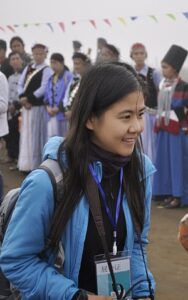
Ying Diao is an ethnomusicologist and cultural anthropologist with research expertise in relationships between cultural production, ethnicity, and politics, and in the anthropology of religion, voice, and mediation. Her work has focused on the musical dynamics of cross-border ethnoreligious development and resilience among upland communities in southwest China and mainland Southeast Asia. Supported by the SEM Deborah Wong Research & Publication Award and AAS Publication Support Grant, her book project, Muted, Mediated, and Mobilized: Faith by Aurality on the China-Myanmar Border, examines how transnational sound production, circulation, and consumption become integral to the Lisu perception and striving after Christian faith amidst constraints and uncertainties. She earned her Ph.D. in ethnomusicology from the University of Maryland, College Park (2016). She was a Research Fellow at the Max Planck Institute for the Study of Religious and Ethnic Diversity, Germany, from 2017-2019, and a lecturer at the University of Minnesota in Spring 2022.
Ying will be partnering with Ragamala Dance Company.
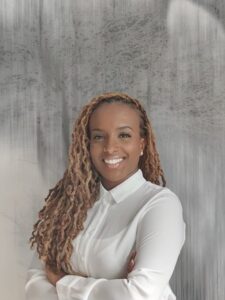 Timnet Gedar is a historian with commitments to community engaged research and social justice. She holds an MSc in Social Development Practice, and graduate certificates in African Studies and Museum Studies. Her work includes research, teaching, and practice in intellectual history, political and social movements, Black print cultures, museums, education, and community engagement. She is a daughter of Eritrea and a proud Chicagoan.
Timnet Gedar is a historian with commitments to community engaged research and social justice. She holds an MSc in Social Development Practice, and graduate certificates in African Studies and Museum Studies. Her work includes research, teaching, and practice in intellectual history, political and social movements, Black print cultures, museums, education, and community engagement. She is a daughter of Eritrea and a proud Chicagoan.
Timnet will be partnering with Chicago Sinfonietta.
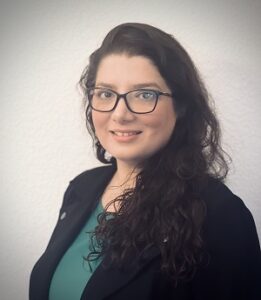 Nazanin Ghaffari holds a Ph.D. in urban planning and public policy from the University of Texas at Arlington. She is interested in navigating disciplinary terrain in urban planning, public administration, feminist geography, and social anthropology to highlight the racialized, classed, gendered, and sexualized blind spots and biases found within conceptualizations of public spaces. Her research concerns inclusionary and/or exclusionary strategies incorporated by signature public spaces governance regimes through design, programming, policing, and management processes. She also investigates how design and planning empower historically marginalized communities through artistic interventions and bottom-up innovations to advance social, racial, and climate justice. Trained as an architect, urban designer, and urban planner, Nazanin has over a decade of professional experience with the United Nations Development Programme, UN-Habitat Mitigation Office, Asia-Pacific Slum Upgrading Working Group, Tehran Municipality Research Center, private design firms, grassroots and community organizations in the Middle East and North Texas.
Nazanin Ghaffari holds a Ph.D. in urban planning and public policy from the University of Texas at Arlington. She is interested in navigating disciplinary terrain in urban planning, public administration, feminist geography, and social anthropology to highlight the racialized, classed, gendered, and sexualized blind spots and biases found within conceptualizations of public spaces. Her research concerns inclusionary and/or exclusionary strategies incorporated by signature public spaces governance regimes through design, programming, policing, and management processes. She also investigates how design and planning empower historically marginalized communities through artistic interventions and bottom-up innovations to advance social, racial, and climate justice. Trained as an architect, urban designer, and urban planner, Nazanin has over a decade of professional experience with the United Nations Development Programme, UN-Habitat Mitigation Office, Asia-Pacific Slum Upgrading Working Group, Tehran Municipality Research Center, private design firms, grassroots and community organizations in the Middle East and North Texas.
Ghaffari will be partnering with Rebuild.
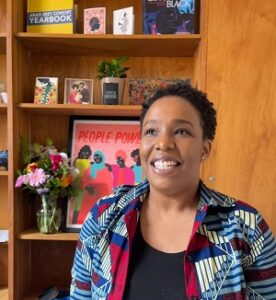 Davinia Gregory-Kameka’s most recent research focuses on sociology of the role of arts organizations and their cultural policy landscape in sustaining or disrupting racial capitalism (Robinson, 1983). Her doctoral work (2015-20) was the first piece of research to fully document the closure, aftermath and legacy creation of a Black-led arts organization; the first empirical analysis of what happens at this point of stress. Such closures often happen quickly and are complex. They are sometimes documented after the fact using document analysis and archival material. However, this empirical, data-rich analysis of what happens in real time when an organization implodes is important because it bridges the gap between what policy documents say about the role and function of what policy calls “cultural diversity in the arts” and what happens (and is needed) on the ground. Among other things, her work asks, what is the importance of Black space in the arts in multiple locations across the Black Atlantic, and how is that space created, contested and supported in the pandemic age?
Davinia Gregory-Kameka’s most recent research focuses on sociology of the role of arts organizations and their cultural policy landscape in sustaining or disrupting racial capitalism (Robinson, 1983). Her doctoral work (2015-20) was the first piece of research to fully document the closure, aftermath and legacy creation of a Black-led arts organization; the first empirical analysis of what happens at this point of stress. Such closures often happen quickly and are complex. They are sometimes documented after the fact using document analysis and archival material. However, this empirical, data-rich analysis of what happens in real time when an organization implodes is important because it bridges the gap between what policy documents say about the role and function of what policy calls “cultural diversity in the arts” and what happens (and is needed) on the ground. Among other things, her work asks, what is the importance of Black space in the arts in multiple locations across the Black Atlantic, and how is that space created, contested and supported in the pandemic age?
Davinia will be partnering with BlackStar.
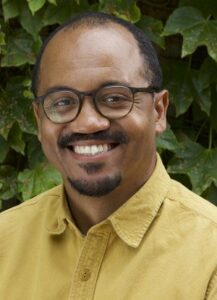 Dr. Cameron Herman is an Assistant Professor in the Department of Sociology and an affiliate faculty member in Africana Studies at Buffalo State College. His teaching and research broadly focuses on understanding the ways marginalized groups experience and navigate social inequalities in urban environments. Cameron has published solo and collaborative journal articles, chapters in edited volumes and online publications on a range of topics including Black artists’ response to gentrification, housing activism and neoliberal governance, Black masculinity in hip hop. In the wake of COVID-19’s onset, Cameron’s research agenda has expanded through collaborations with community partners and equity-minded scholars in the UB Food Systems and Healthy Communities lab to support community-based responses to inequitable food systems in Buffalo, NY. In his free time, Cameron enjoys spending time with his wife and daughter, exploring neighborhoods on his bicycle and photographing everyday life.
Dr. Cameron Herman is an Assistant Professor in the Department of Sociology and an affiliate faculty member in Africana Studies at Buffalo State College. His teaching and research broadly focuses on understanding the ways marginalized groups experience and navigate social inequalities in urban environments. Cameron has published solo and collaborative journal articles, chapters in edited volumes and online publications on a range of topics including Black artists’ response to gentrification, housing activism and neoliberal governance, Black masculinity in hip hop. In the wake of COVID-19’s onset, Cameron’s research agenda has expanded through collaborations with community partners and equity-minded scholars in the UB Food Systems and Healthy Communities lab to support community-based responses to inequitable food systems in Buffalo, NY. In his free time, Cameron enjoys spending time with his wife and daughter, exploring neighborhoods on his bicycle and photographing everyday life.
Cameron will be partnering with 1Hood Media.
 Raquel Jimenez’s research explores socially-engaged creative practices and the distinct place-based logics that guide community arts organizations. This interest is reflected in her dissertation, “Taking Up Space: Youth Culture and Creative Resistance in a Gentrifying City,” an ethnographic study that examines how youth engage with public artmaking strategies to resist gentrification, while investigating how community arts education structures this process. Raquel teaches courses on art and culture at the Harvard Graduate School of Education and designs participatory community arts programs at the intersection of art, education, and cultural organizing. Her work has been supported by the Ford Foundation and the National Academies of Sciences, Engineering, and Medicine. Apart from research and teaching, Raquel is a member of the Sirens Crew, an all-womxn public art collective working to feminize public space through a variety of visual intervention strategies.
Raquel Jimenez’s research explores socially-engaged creative practices and the distinct place-based logics that guide community arts organizations. This interest is reflected in her dissertation, “Taking Up Space: Youth Culture and Creative Resistance in a Gentrifying City,” an ethnographic study that examines how youth engage with public artmaking strategies to resist gentrification, while investigating how community arts education structures this process. Raquel teaches courses on art and culture at the Harvard Graduate School of Education and designs participatory community arts programs at the intersection of art, education, and cultural organizing. Her work has been supported by the Ford Foundation and the National Academies of Sciences, Engineering, and Medicine. Apart from research and teaching, Raquel is a member of the Sirens Crew, an all-womxn public art collective working to feminize public space through a variety of visual intervention strategies.
Raquel will be partnering with Pregones PRTT.
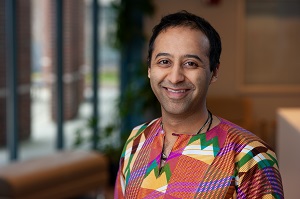 Asif Majid is a scholar-artist-educator working at the intersection of racialized sociopolitical identities, multimedia, marginality, and new performance, particularly through devising community-based participatory theatre, making improvisational music, and addressing the nexus of Islam and performance. He has published in a range of academic and popular media outlets, and his performance credits include work with the Kennedy Center in the US and the Royal Exchange Theatre in the UK, among others. Asif was a Mellon/ACLS Public Fellow with the San Francisco Arts Commission and a Lab Fellow with The Laboratory for Global Performance and Performance. He earned his PhD in Anthropology, Media, and Performance from The University of Manchester. Currently, Asif is Assistant Professor of Theatre and Human Rights at the University of Connecticut, where he is at work on a book project titled Making Muslimness: Race, Religion, and Performance in Contemporary Britain. Asif can be found online at www.asifmajid.com.
Asif Majid is a scholar-artist-educator working at the intersection of racialized sociopolitical identities, multimedia, marginality, and new performance, particularly through devising community-based participatory theatre, making improvisational music, and addressing the nexus of Islam and performance. He has published in a range of academic and popular media outlets, and his performance credits include work with the Kennedy Center in the US and the Royal Exchange Theatre in the UK, among others. Asif was a Mellon/ACLS Public Fellow with the San Francisco Arts Commission and a Lab Fellow with The Laboratory for Global Performance and Performance. He earned his PhD in Anthropology, Media, and Performance from The University of Manchester. Currently, Asif is Assistant Professor of Theatre and Human Rights at the University of Connecticut, where he is at work on a book project titled Making Muslimness: Race, Religion, and Performance in Contemporary Britain. Asif can be found online at www.asifmajid.com.
Asif will be partnering with the Arab American National Museum.
 Jason J. Price is an Arts Research with Communities of Color (ARCC) Fellow, working in collaboration with his matched organization to explore how social science research can contribute to a thriving and more equitable arts field. He earned a PhD in sociocultural anthropology from UC Berkeley and an Advanced Certificate in Culture & Media from NYU. His dissertation research, funded by the Fulbright Program, focused on the cultivation of endurance in a Pentecostal ministry in Malawi. His documentary short, The Professor, a portrait of former Interim President of Liberia, David Kpormakpor, has screened at festivals worldwide. From 2018-2020, he was Postdoctoral Researcher at IUPUI’s Arts & Humanities Institute, where he worked with equity-driven arts organizations to improve their reach and efficacy.
Jason J. Price is an Arts Research with Communities of Color (ARCC) Fellow, working in collaboration with his matched organization to explore how social science research can contribute to a thriving and more equitable arts field. He earned a PhD in sociocultural anthropology from UC Berkeley and an Advanced Certificate in Culture & Media from NYU. His dissertation research, funded by the Fulbright Program, focused on the cultivation of endurance in a Pentecostal ministry in Malawi. His documentary short, The Professor, a portrait of former Interim President of Liberia, David Kpormakpor, has screened at festivals worldwide. From 2018-2020, he was Postdoctoral Researcher at IUPUI’s Arts & Humanities Institute, where he worked with equity-driven arts organizations to improve their reach and efficacy.
Jason will be partnering with Pillsbury House + Theater.
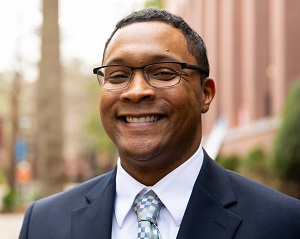 Dr. Jason C. White is an Assistant Professor of Arts Administration in the Department of Art at Xavier University, where he prepares students for diverse careers in arts administration. An accomplished researcher, educator, author and theorist, White has published in Artivate: A Journal of Entrepreneurship in the Arts, Journal of Arts Management, Law and Society, Innovative Higher Education, and Arts Education Policy Review. White is also the author of Innovation in the Arts: Concepts, Theories and Practices, a recent Routledge publication. White is one of the co-creators of the AAAE Undergraduate Standards for Arts Administration Education. Prior to receiving his PhD in Arts Administration, Education and Policy from The Ohio State University, White earned a BFA from California Institute of the Arts and attended The University of Akron; obtaining a Masters degree in Arts Administration and a Masters degree in Educational Assessment. Learn more about Dr. White at Xavier University.
Dr. Jason C. White is an Assistant Professor of Arts Administration in the Department of Art at Xavier University, where he prepares students for diverse careers in arts administration. An accomplished researcher, educator, author and theorist, White has published in Artivate: A Journal of Entrepreneurship in the Arts, Journal of Arts Management, Law and Society, Innovative Higher Education, and Arts Education Policy Review. White is also the author of Innovation in the Arts: Concepts, Theories and Practices, a recent Routledge publication. White is one of the co-creators of the AAAE Undergraduate Standards for Arts Administration Education. Prior to receiving his PhD in Arts Administration, Education and Policy from The Ohio State University, White earned a BFA from California Institute of the Arts and attended The University of Akron; obtaining a Masters degree in Arts Administration and a Masters degree in Educational Assessment. Learn more about Dr. White at Xavier University.
Jason will be partnering with The Union for Contemporary Art.
 DeRon S. Williams is an Assistant Professor of Theatre in the Department of Fine and Performing Arts at Loyola University Chicago and a freelance director and dramaturg. He has published in The Journal of American Drama and Theatre, Continuum: The Journal of African Diaspora Drama. His directing credits include Tarell Alvin McCraney’s The Brothers Size, Regina Taylor’s Crowns, Bruce Norris’s Clybourne Park, and Africa to America: A Celebration of Who We Are, an interdisciplinary performance written by Wendy R. Coleman. DeRon is also co-editor of the forthcoming edited volume titled Contemporary Black Theatre & Performance: Acts of Rebellion, Activism, and Solidarity, as a part of the Methuen Drama Agitations: Politics, Text, Performance series.
DeRon S. Williams is an Assistant Professor of Theatre in the Department of Fine and Performing Arts at Loyola University Chicago and a freelance director and dramaturg. He has published in The Journal of American Drama and Theatre, Continuum: The Journal of African Diaspora Drama. His directing credits include Tarell Alvin McCraney’s The Brothers Size, Regina Taylor’s Crowns, Bruce Norris’s Clybourne Park, and Africa to America: A Celebration of Who We Are, an interdisciplinary performance written by Wendy R. Coleman. DeRon is also co-editor of the forthcoming edited volume titled Contemporary Black Theatre & Performance: Acts of Rebellion, Activism, and Solidarity, as a part of the Methuen Drama Agitations: Politics, Text, Performance series.
DeRon will be partnering with PHILADANCO!
This article originally appeared on The Wallace Foundation website. It is reprinted here with permission. Images are courtesy of SSRC and the Wallace Foundation.
____
We accept submissions on topics relevant to the field: advocacy, artistic issues, arts policy, community building, development, employment, engagement, touring, and other topics that deal with the business of dance. We cannot publish criticism, single-company season announcements, and single-company or single artist profiles. Additionally, we welcome feedback on articles. If you have a topic that you would like to see addressed or feedback, please contact communications@danceusa.org.
Disclaimer: Opinions expressed in guest posts do not necessarily represent the viewpoints of Dance/USA.





